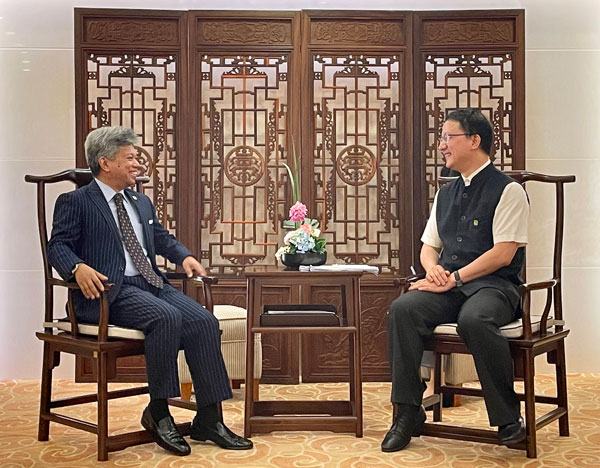
On June 21, 2022, Director-General of the Department of Asian Affairs of the Foreign Ministry Liu Jinsong met with Malaysian Ambassador to China Raja Dato' Nushirwan Zainal Abidin. The two sides exchanged in-depth views on China-Malaysia relations and international and regional issues of common concern.
Liu Jinsong said, at the forum hosted by the Center for China and Globalization (CCG), Your Excellency Ambassador spoke highly of China-Malaysia relations, stressed that the West needs to accept the new reality and countries of the Global South do not need to accept the so-called Western leadership around the globe, and called on people to treat each other rationally, objectively and honestly and maintain the right development direction of economic globalization. I appreciate your opinions. As both developing countries and emerging economies, China and Malaysia have always been firm supporters and active advocates of economic globalization and regional economic integration. In the face of complex international and regional situations and various risks and challenges, the two countries "climb the hill together and go down the ravine together", uphold Asian values and the Asian way, firmly practice true multilateralism, and are committed to achieving common development and enhancing bilateral and multilateral cooperation constantly. Next year will mark the 10th anniversary of the establishment of China-Malaysia comprehensive strategic partnership, and the year after next will mark the 50th anniversary of the establishment of diplomatic relations between the two countries. China is ready to work with Malaysia to take the opportunity of jointly celebrating the "two anniversaries" to continuously strengthen strategic communication, continue to exert "positive energy" in global governance and regional cooperation and help bilateral relations embark on a new journey and march forward for a new height.
Liu Jinsong pointed out that, there are two ideologies about regional cooperation: one is "connectivity", which advocates being unblocked, unimpeded and connected; the other is "blockage", which is about setting up barriers, building walls and stirring up troubles. One is "I'm well and I hope everyone is well"; the other is "I'm well but you can't be well" or "I'm not well, let alone you." As the world faces the threat of high inflation and the acute security of food, energy and industrial and supply chains, certain countries do not seriously reflect on and solve their own problems; instead, they are busy forming various blocs, suppressing and containing other countries, and "scapegoating" and shifting blame to others. These are typical behaviors of stirring up troubles.
Liu Jinsong said that the Chinese side recently released the Reality Check: Falsehoods in US Perceptions of China, which is based on facts and figures. The United States has serious problems of human trafficking and forced labor. It has committed piles of crimes of trafficking and enslaving Africans and African Americans. With more than 260 mass shooting incidents and nearly 20,000 deaths so far this year, the United States has a poor human rights record. The United States does not look squarely at its deep-seated illness such as human trafficking and gun violence, but continues to hype up the so-called "forced labor" issue in other countries and arbitrarily uses political coercion and economic sanctions. This is an act of practicing unilateralism, protectionism and hegemonism in the name of "human rights".
Liu Jinsong said that the "Indo-Pacific Economic Framework" launched by the United States has been packaged a lot, but in essence, it is part of the U.S. "Indo-Pacific strategy". It aims to frame other countries with its own standards and rules and start all over again outside the multilateral trading system based on the World Trade Organization. As a Malaysian saying goes, "Honey on the outside, but gall on the inside." The United States politicizes economic issues and turns them into ideological issues. Even normal trade in goods is measured by whether it conforms to American values. This violates basic economic laws, puts shackles on the free market, and runs counter to the trend of economic globalization. State Councilor and Foreign Minister Wang Yi recently pointed out that the criteria for evaluating any cooperation framework should be "three shoulds and three shouldn'ts", namely, it "should" promote free trade, and "shouldn't" engage in disguised protectionism; it "should" contribute to the world economic recovery, and "shouldn't" undermine the stability of the industrial chain; it "should" promote openness and cooperation, and "shouldn't" create geopolitical confrontation. Under the current circumstances, we expect that regional countries and China work together to implement the Regional Comprehensive Economic Partnership, uphold the ASEAN-centered regional cooperation architecture, safeguard the common interests of developing countries, and jointly resist acts of forming cliques and creating divisions and confrontations.
Nushirwan said, at the CCG Forum, I stressed that ensuring unimpeded industrial and supply chains and flow of personnel is crucial to economic recovery and that economic globalization is irreversible. Malaysia highly recognizes China's important role in regional cooperation and global division of labor, and looks forward to working with China to further deepen practical cooperation in various fields, resume normal personnel exchanges at an early date and promote the continuous development of bilateral relations. Malaysia will continue to adhere to strategic autonomy, firmly safeguard the mature ASEAN-centered regional cooperation architecture, and continue to enhance open and inclusive regional cooperation.
